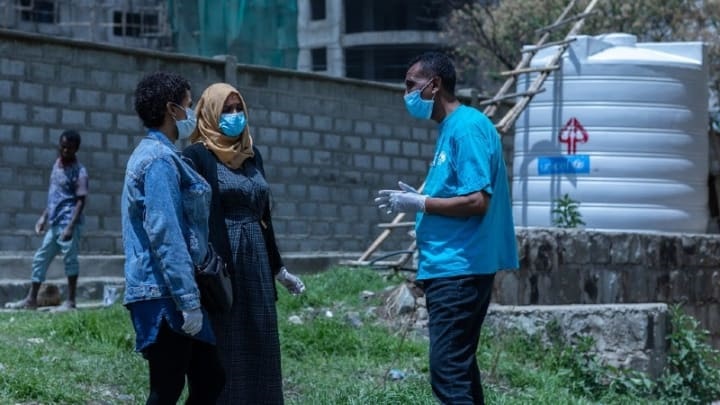By Emma Smith, Vince Chadwick // 26 May 2020

Health workers at a quarantine center at Basha Wolde, Addis Ababa, Ethiopia. Photo by: © UNICEF Ethiopia / 2020 / Mulugeta Ayene / CC BY-NC-ND
GLASGOW, Scotland/BRUSSELS — Global development workers increasingly fear that their organization will not survive the COVID-19 pandemic, with concern greatest among those in Africa.
Devex’s latest COVID-19 Trends Tracker survey asked 580 professionals from 162 countries how the virus is affecting them.
Overall, 60% of respondents are worried the pandemic could mean the end for the organization they work for, up from 55% a month ago. But there were stark contrasts between regions — 39% of respondents in Africa and 33% of those in the Middle East were “very concerned” for the future of their employer, while in both North America and Europe, just 6% of respondents shared this sentiment.
Of the respondents based in Africa, the majority — 31% — work for an NGO, while 18% identify as independent consultants. Donor agency or government staff make up 13% of the respondents from this region.
The survey also revealed that immediate cuts to development funding are being seen across all regions. Half of respondents based in the Middle East and 49% of those in Africa say the organization they work for has lost funding as a result of the pandemic, while in Europe and North America, a slightly lower number of professionals say this has happened — 40% and 35% respectively.
“COVID has paralyzed most development organizations that entirely depend on donors,” said one respondent who works with a development consulting firm based in Africa. “Funds have been redirected to emergency concerns rendering most staff jobless and programs halted altogether,” they added.
Meanwhile, an independent consultant based in Asia suggested that a “lack of clear government direction has made donors weary,” and this is causing some organizations to lose funding.
Zuzana Sládková, policy and advocacy coordinator on financing and funding for sustainable development at the European NGO confederation CONCORD, told Devex that concerns about aid budgets possibly falling underscored the need to support local NGOs.
In April, for instance, CONCORD argued in a submission to EU policymakers that the $100 million set aside for civil society organizations in the United Nations’ $2.01 billion global appeal was “highly insufficient.”
“In many places only CSOs, and in particular local CSOs, are able to reach the populations most left behind,” the confederation wrote.
Unequal impact on global south
More than half — 54% — of professionals based in Africa have already lost their job or know someone who has, while 35% are “very concerned” that they may yet lose their job as a result of the pandemic.
“While the virus itself hasn’t hit Africa as hard as other places, the economic fallout is huge,” David McNair, executive director for global policy at ONE Campaign, told Devex. “In Kenya alone, at least 130,000 formal jobs have been lost, while 500,000 workers have been put on unpaid leave,” he added, citing ONE’s own Africa COVID-19 tracker on the effects of the virus on the continent.
Many professionals based in different African countries expressed concern in the survey that donor countries would be facing an “internal economic crisis” and focusing on this in the wake of the pandemic. One respondent, who said they worked for a host government, thought their organization would survive just six months, while an NGO worker said the employer they worked for had managed to sustain existing funding but “may experience difficulties” in securing this in the long-term.
Funding pools were already restricted before the pandemic, which brought new requests and priorities, said another respondent who works with an NGO in Africa, reflecting a common concern that donors may continue to reallocate funding as the pandemic drags on.
Another respondent, who works with a development consulting organization, was more optimistic, however. “We are confident this is not a permanent situation and that things will recover,” they said.
In Asia, where 53% of respondents say they have already lost their job or know someone who has, there were also concerns that cuts in donor funding could mean uncertainty for the future of development organizations. “Our regular donors have already informed us that there will be funding cuts for the next year,” one concerned NGO worker said.
Another respondent, who works for a donor agency, told Devex that while their organization is currently receiving more funding for the COVID-19 response, they expect this could change as “donors have to shift their development funds back home.”
Meanwhile, a consultant said that “organizations are currently relying on the funding agreed upon in yesteryears,” but there is uncertainty as to how cuts from donors could affect this.
Of those respondents still working, a number of NGO staff in Africa and Asia said they have already had their own pay cut as a result of funding losses. For some, this has meant salary reductions of 20-40%.

Percentage of respondents from Devex’s COVID-19 Trends Tracker survey who say the organization they primarily work for has lost funding as a result of the pandemic.
Donor countries concerned but less so
There have been job losses in Europe and North America as a result of the pandemic but professionals based there were, generally, less concerned about the financial survival of their employer and future job security, according to the survey.
In Europe, 18% of respondents were “very concerned” about their future job security and in North America, only 7% of respondents felt this way.
A lot depends on how long the pandemic continues, one respondent who works with an NGO said — adding that they were “somewhat” concerned.
“We’ll survive FY20 but if there is a second (or third) wave, and the world economy further deteriorates, it’s very difficult to say that my organization will survive.”
There is cause for concern as funders and donors are anticipating a global recession, one European-based NGO worker said. And “the protectionist attitude of many main donors, particularly the U.S. government, is adding additional stress and creating shortfalls,” they added.
An independent consultant based in North America said that “a focus on domestic issues may reduce the priority for development funding.”
But other staff were less alarmed by anticipated cutbacks, citing a “solid donor base” or “well-managed reserves” as enough to ensure the financial survival of their employer.





